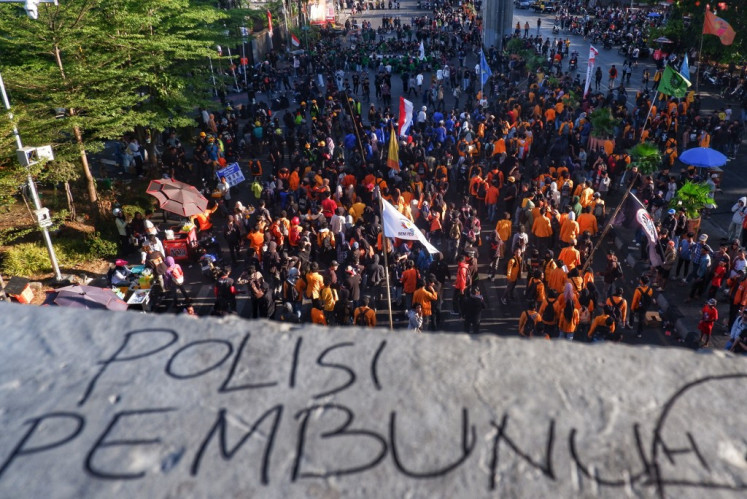Popular Reads
Top Results
Can't find what you're looking for?
View all search resultsPopular Reads
Top Results
Can't find what you're looking for?
View all search resultsReligious harmony is a must, but how?
President Susilo Bambang Yudhoyono underlined the importance of the roles played by leaders and religious figures in solving various conflicts taking place across the country
Change text size
Gift Premium Articles
to Anyone
P
resident Susilo Bambang Yudhoyono underlined the importance of the roles played by leaders and religious figures in solving various conflicts taking place across the country.
“As the head of state, I invite and urge leaders and religious figures to guide people and apply their religious teachings as properly as possible,” he said in his speech at a commemorative ceremony celebrating the centenary of a Catholic church in Manggarai regency, East Nusa Tenggara (NTT), on Friday.
The President said that leaders and religious figures should continuously strive to seek peaceful solutions to the various conflicts.
“Building and maintaining religious harmony as well as presenting enlightened examples of leadership are part of the requirements needed to settle conflict,” he said as quoted by Antara news agency.
Yudhoyono said that amid the heterogeneity and dynamism of Indonesia, sometimes conflicts arose in which leaders and religious figures should be active in the search for a peaceful resolution.
The President, however, stopped short of mentioning any concrete steps needed to settle the various religious conflicts taking place in a number of areas throughout Indonesia.
The discovery that a regent in Aceh ordered the closure of 20 churches in April this year raises concerns over growing intolerance, which may trigger communal conflicts.
The closures were ordered by Aceh Singkil’s acting regent Razali AR in a letter signed on April 30, which ordered members of the congregations to tear down the churches themselves by June 8 at the latest.
Following the closures, there are now only two churches open in Aceh Singkil, both built after 2000. Most of the churches selected for demolition were built in the 1930s and 1940s. The dispute in Aceh adds to the long list of incidents of religious intolerance in the nation.
In Bekasi, West Java, the Congregation of the Filadelfia Batak Protestant Churches (HKBP) continues to be regularly assaulted and harassed by Muslims when it tries to conduct Sunday services.
The Bekasi regency sealed off the church site in 2010 after local residents objected to the construction of the church. The regency continues to refuse to open the site even after the Bandung State Administrative Court ruled in favor of HKBP Filadelfia.
Members of the Taman Yasmin Indonesian Christian Church (GKI) face similar harassment in Bogor, also in West Java.
Various human rights groups have also reported cases of attacks on Ahmadis and Shiites, including congregations in Cikeusik, Banten, Tangerang and Sampang in East Java.
Last month, Yudhoyono spoke before the UN General Assembly, calling on the UN’s member states to adopt a legally binding instrument to ban blasphemy and to promote dialogue between different faiths, civilizations and cultures.
He added that such an instrument was needed to prevent the incitement of violence based on religion.
Indonesia has ratified various international laws that legally bind the government to guarantee its people religious freedom. These laws include the International Covenant on Civil and Political Rights (ICCPR), which was ratified by Indonesia in 2005.
Friday’s ceremony was also attended by Cabinet ministers, NTT leaders and religious figures.
After the ceremony and before returning to Jakarta, the President and his entourage traveled to Labuan Bajo, the main gate for Komodo National Park, before flying on an Air Force Hercules airplane to Central Sumba.
Table of religious intolerance:
• During the era of President Susilo Bambang Yudhoyono (as of 2007) 108 churches have been closed/damaged; in the era of president Megawati Soekarnoputri, 92; in the era of president Abdurrahman Wahid, 232; in the era of president Soeharto, 456.
• Based on data from the Manado Post daily, there were 2,442 cases of church closures and demolitions in the period between 2004 and 2010.
• In 2011, Setara Institute recorded 244 cases of religious intolerance in 17 regions. The largest number of cases was recorded in West Java (57 cases), followed by South Sulawesi (45), East Java (31), North Sumatra (24) and Banten (12).
Sources: The Jakarta Post and Setara Institute
Markus Makur contributed to this report from Ruteng.










